- Home
- Jodi Picoult
Change of Heart Page 6
Change of Heart Read online
Page 6
Suddenly I couldn't breathe. The blankets were too hot, the cream on my skin too thick. I wanted out of the layers and began to fight my way free.
"Whoa," DeeDee said. "Hang on, let me help you." She pulled and peeled and handed me a towel. "Your mother didn't tell me you were claustrophobic."
I sat up, drawing great gasps of air into my lungs. Of course she didn't, I thought. Because she's the one who's suffocating me.
Lucius
|||||||||||||||||||||||||
It was late afternoon, almost time for the shift change, and I-tier was relatively quiet. Me, I'd been sick all day, hazing in and out of sleep brought on by fever. Calloway, who usually played chess with me, was playing with Shay instead. "Bishop takes a6," Calloway called out. He was a racist bigot, but Calloway was also the best chess player I'd ever met.
During the day, Batman the Robin resided in his breast pocket, a small lump no bigger than a pack of Starburst candies. Sometimes it crawled onto his shoulder and pecked at the scars on his scalp. At other times, he kept Batman in a paperback copy of The Stand that had been doctored as a hiding place--starting on chapter six, a square had been cut out of the pages of the thick book with a pilfered razor blade, creating a little hollow that Calloway lined with tissues to make a bed. The robin ate mashed potatoes; Calloway traded precious masking tape and twine and even a homemade handcuff key for extra portions.
"Hey," Calloway said. "We haven't made a wager on this game."
Crash laughed. "Even Bourne ain't dumb enough to bet you when he's losing."
"What have you got that I want?" Calloway mused.
"Intelligence?" I suggested. "Common sense?"
"Keep out of this, homo." Calloway thought for a moment. "The brownie. I want the damn brownie."
By now, the brownie was two days old. I doubted that Calloway would even be able to swallow it. What he'd enjoy, mostly, was the act of taking it away from Shay.
"Okay," Shay said. "Knight to g6."
I sat up on my bunk. "Okay? Shay, he's beating the pants off you."
"How come you're too sick to play, DuFresne, but you don't mind sticking your two cents into every conversation?" Calloway said. "This is between me and Bourne."
"What if I win?" Shay asked. "What do I get?"
Calloway laughed. "It won't happen."
"The bird."
"I'm not giving you Batman--"
"Then I'm not giving you the brownie." There was a beat of silence.
"Fine," Calloway said. "You win, you get the bird. But you're not going to win, because my bishop takes d3. Consider yourself officially screwed."
"Queen to h7," Shay replied. "Checkmate."
"What?" Calloway cried. I scrutinized the mental chessboard I'd been tracking--Shay's queen had come out of nowhere, screened by his knight. There was nowhere left for Calloway to go.
At that moment the door to I-tier opened, admitting a pair of officers in flak jackets and helmets. They marched to Calloway's cell and brought him onto the catwalk, securing his handcuffs to a metal railing along the far wall.
There was nothing worse than having your cell searched. In here, all we had were our belongings, and having them pored over was a gross invasion of privacy. Not to mention the fact that when it happened, you had an excellent chance of losing your best stash, be that drugs or hooch or chocolate or art supplies or the stinger rigged from paper clips to heat up your instant coffee.
They came in with flashlights and long-handled mirrors and worked systematically. They'd check the seams of the walls, the vents, the plumbing. They'd roll deodorant sticks all the way out to make sure nothing was hidden underneath. They'd shake containers of powder to hear what might be inside. They'd sniff shampoo bottles, open envelopes, and take out the letters inside. They'd rip off your bedsheets and run their hands over the mattresses, looking for tears or ripped seams.
Meanwhile, you were forced to watch.
I could not see what was going on in Calloway's cell, but I had a pretty good idea based on his reactions. He rolled his eyes as his blanket was checked for unraveled threads; his jaw tensed when a postage stamp was peeled off an envelope, revealing the black tar heroin underneath. But when his bookshelf was inspected, Calloway flinched. I looked for the small bulge in his breast pocket that would have been the bird and realized that Batman the Robin was somewhere inside that cell.
One of the officers held up the copy of The Stand. The pages were riffled, the spine snapped, the book tossed against the cell wall. "What's this?" an officer asked, focusing not on the bird that had been whipped across the cell but on the baby-blue tissues that fluttered down over his boots.
"Nothing," Calloway said, but the officer wasn't about to take his word for it. He picked through the tissues, and when he didn't find anything, he confiscated the book with its carved hidey-hole.
Whitaker said something about a write-up, but Calloway wasn't listening. I could not remember ever seeing him quite so unraveled. As soon as he was released back into his cell, he ran to the rear corner where the bird had been flung.
The sound that Calloway Reece made was primordial; but then maybe that was always the case when a grown man with no heart started to cry.
There was a crash, and a sickening crunch. A whirlwind of destruction as Calloway fought back against what couldn't be fixed. Finally spent, Calloway sank down to the floor of his cell, cradling the dead bird. "Motherfucker. Motherfucker."
"Reece," Shay interrupted, "I want my prize."
My head snapped around. Surely Shay wasn't stupid enough to antagonize Calloway.
"What?" Calloway breathed. "What did you say?"
"My prize. I won the chess game."
"Not now," I hissed.
"Yes, now," Shay said. "A deal's a deal."
In here, you were only as good as your word, and Calloway--with his Aryan Brotherhood sensibilities--would have known that better than anyone else. "You better make sure you're always behind those bars," Calloway vowed, "because the next time I get the chance, I'm going to mess you up so bad your own mama wouldn't know you." But even as he threatened Shay, Calloway gently wrapped the dead bird in a tissue and attached the small, slight bundle to the end of his fishing line.
When the robin reached me, I drew it under the three-inch gap beneath the door of my cell. It still looked half cooked, its closed eye translucent blue. One wing was bent at a severe backward angle; its neck lolled sideways.
Shay sent out his own line of string, with a weight made of a regulation comb on one end. I saw his hands gently slide the robin, wrapped in tissue, into his cell. The lights on the catwalk flickered.
I've often imagined what happened next. With an artist's eye, I like to picture Shay sitting on his bunk, cupping his palms around the tiny bird. I imagine the touch of someone who loves you so much, he cannot bear to watch you sleep; and so you wake up with his hand on your heart. In the long run, though, it hardly matters how Shay did it. What matters is the result: that we all heard the piccolo trill of that robin; that Shay pushed the risen bird beneath his cell door onto the catwalk, where it hopped, like broken punctuation, toward Calloway's outstretched hand.
June
|||||||||||||||||||||||||
If you're a mother, you can look into the face of your grown child and see, instead, the one that peeked up at you from the folds of a baby blanket. You can watch your eleven-year-old daughter painting her nails with glitter polish and remember how she used to reach for you when she wanted to cross the street. You can hear the doctor say that the real danger is adolescence, because you don't know how the heart will respond to growth spurts--and you can pretend that's ages away.
"Best two out of three," Claire said, and from the folds of her hospital johnny she raised her fist again.
I lifted my hand, too. Rock, paper, scissors, shoot.
"Paper." Claire grinned. "I win."
"You totally do not," I said. "Hello? Scissors?"
"What I forgot to tell you i
s that it's raining, and the scissors got rusty, and so you slip the paper underneath them and carry them away."
I laughed. Claire shifted slightly, careful not to dislodge all the tubes and the wires. "Who'll feed Dudley?" she asked.
Dudley was our dog--a thirteen-year-old springer spaniel who, along with me, was one of the only pieces of continuity between Claire and her late sister. Claire may never have met Elizabeth, but they had both grown up draping faux pearls around Dudley's neck, dressing him up like the sibling they never had. "Don't worry about Dudley," I said. "I'll call Mrs. Morrissey if I have to."
Claire nodded and glanced at the clock. "I thought they'd be back already."
"I know, baby."
"What do you think's taking so long?"
There were a hundred answers to that, but the one that floated to the top of my mind was that in some other hospital, two counties away, another mother had to say good-bye to her child so that I would have a chance to keep mine.
The technical name for Claire's illness was pediatric dilated cardiomyopathy. It affected twelve million kids a year, and it meant that her heart cavity was enlarged and stretched, that her heart couldn't pump blood out efficiently. You couldn't fix it or reverse it; if you were lucky you could live with it. If you weren't, you died of congestive heart failure. In kids, 79 percent of the cases came from an unknown origin. There was a camp that attributed its onset to myocarditis and other viral infections during infancy; and another that claimed it was inherited through a parent who was a carrier of the defective gene. I had always assumed the latter was the case with Claire. After all, surely a child who grew out of grief would be born with a heavy heart.
At first, I didn't know she had it. She got tired more easily than other infants, but I was still moving in slow motion myself and did not notice. It wasn't until she was five, hospitalized with a flu she could not shake, that she was diagnosed. Dr. Wu said that Claire had a slight arrhyth mia that might improve and might not; he put her on Captopril, Lasix, Lanoxin. He said that we'd have to wait and see.
On the first day of fifth grade, Claire told me it felt like she had swallowed a hummingbird. I assumed it was nerves about starting classes, but hours later--when she stood up to solve a math problem at the chalkboard--she passed out cold. Progressive arrhythmias made the heart beat like a bag of worms--it wouldn't eject any blood. Those basketball players who seemed so healthy and then dropped dead on the court? That was ventricular fibrillation, and it was happening to Claire. She had surgery to implant an AICD--an automatic implantable cardioverter-defibrillator, or, in simpler terms, a tiny, internal ER resting right on her heart, which would fix future arrhythmias by administering an electric shock. She was put on the list for a transplant.
The transplant game was a tricky one--once you received a heart, the clock started ticking, and it wasn't the happy ending everyone thought it was. You didn't want to wait so long for a transplant that the rest of the bodily systems began to shut down. But even a transplant wasn't a miracle: most recipients could only tolerate a heart for ten or fifteen years before complications ensued, or there was outright rejection. Still, as Dr. Wu said, fifteen years from now, we might be able to buy a heart off a shelf and have it installed at Best Buy ... the idea was to keep Claire alive long enough to let medical innovation catch up to her.
This morning, the beeper we carried at all times had gone off. We have a heart, Dr. Wu had said when I called. I'll meet you at the hospital.
For the past six hours, Claire had been poked, pricked, scrubbed, and prepped so that the minute the miracle organ arrived in its little Igloo cooler, she could go straight into surgery. This was the moment I'd waited for, and dreaded, her whole life.
What if ... I could not even let myself say the words.
Instead, I reached for Claire's hand and threaded our fingers together. Paper and scissors, I thought. We are between a rock and a hard place. I looked at the fan of her angel hair on the pillow, the faint blue cast of her skin, the fairy-light bones of a girl whose body was still too much for her to handle. Sometimes, when I looked at her, I didn't see her at all; instead, I pretended that she was--
"What do you think she's like?"
I blinked, startled. "Who?"
"The girl. The one who died."
"Claire," I said. "Let's not talk about this."
"Why not? Don't you think we should know all about her if she's going to be a part of me?"
I touched my hand to her head. "We don't even know it's a girl."
"Of course it's a girl," Claire said. "It would be totally gross to have a boy's heart."
"I don't think that's a qualification for a match."
She shuddered. "It should be." Claire struggled to push herself upright so that she was sitting higher in the hos pital bed. "Do you think I'll be different?"
I leaned down and kissed her. "You," I pronounced, "will wake up and still be the same kid who cannot be bothered to clean her room or walk Dudley or turn out the lights when she goes downstairs."
That's what I said to Claire, anyway. But all I heard were the first four words: You will wake up.
A nurse came into the room. "We just got word that the harvest's begun," she said. "We should have more information shortly; Dr. Wu's on the phone with the team that's on-site."
After she left, Claire and I sat in silence. Suddenly, this was real--the surgeons were going to open up Claire's chest, stop her heart, and sew in a new one. We had both heard numerous doctors explain the risks and the rewards; we knew how infrequently pediatric donors came about. Claire shrank down in the bed, her covers sliding up to her nose. "If I die," Claire said, "do you think I'll get to be a saint?"
"You won't die."
"Yeah, I will. And so will you. I just might do it a little sooner."
I couldn't help it; I felt tears welling up in my eyes. I wiped them on the edge of the hospital sheets. Claire fisted her hand in my hair, the way she used to when she was little. "I bet I'd like it," Claire said. "Being a saint."
Claire had her nose in a book constantly, and recently, her Joan of Arc fascination had bloomed into all things martyred.
"You aren't going to be a saint."
"You don't know that for sure," Claire said.
"You're not Catholic, for one thing. And besides, they all died horrible deaths."
"That's not always true. You can be killed while you're being good, and that counts. St. Maria Goretti was my age when she fought off a guy who was raping her and was killed and she got to be one."
"That's atrocious," I said.
"St. Barbara had her eyeballs cut out. And did you know there's a patron saint of heart patients? John of God?"
"The question is, why do you know there's a patron saint of heart patients?"
"Duh," Claire said. "I read about it. It's all you let me do." She settled back against the pillows. "I bet a saint can play softball."
"So can a girl with a heart transplant."
But Claire wasn't listening; she knew that hope was just smoke and mirrors; she'd learned by watching me. She looked up at the clock. "I think I'll be a saint," she said, as if it were entirely up to her. "That way no one forgets you when you're gone."
The funeral of a police officer is a breathtaking thing. Officers and firemen and public officials will come from every town in the state and some even farther away. There is a procession of police cruisers that precedes the hearse; they blanket the highway like snow.
It took me a long time to remember Kurt's funeral, because I was working so hard at the time to pretend it wasn't happening. The police chief, Irv, rode with me to the graveside service. There were townspeople lining the streets of Lynley, with handmade signs that read PROTECT AND SERVE, and THE ULTIMATE SACRIFICE. It was summertime, and the asphalt sank beneath the heels of my shoes where I stood. I was surrounded by other policemen who'd worked with Kurt, and hundreds who didn't, a sea of dress blue. My back hurt, and my feet were swollen. I found myself concentrating on
a lilac tree that shuddered in the breeze, petals falling like rain.
The police chief had arranged for a twenty-one-gun salute, and as it finished, five fighter jets rose over the distant violet mountains. They sliced the sky in parallel lines, and then, just as they flew overhead, the plane on the far right broke off like a splinter, soaring east.
When the priest stopped speaking--I didn't listen to a word of it; what could he tell me about Kurt that I didn't already know?--Robbie and Vic stepped forward. They were Kurt's closest friends in the department. Like the rest of the Lynley force, they had covered their badges with black fabric. They reached for the flag that draped Kurt's coffin and began to fold it. Their gloved hands moved so fast--I thought of Mickey Mouse, of Donald Duck, with their oversized white fists. Robbie was the one who put the triangle into my arms, something to hold on to, something to take Kurt's place.
Through the radios of the other policemen came the voice of the dispatcher: All units stand by for a broadcast.
Final call for Officer Kurt Nealon, number 144.
144, report to 360 West Main for one last assignment.
It was the address of the cemetery.
You will be in the best of hands. You will be deeply missed.
144, 10-7. The radio code for end of shift.
I have been told that afterward, I walked up to Kurt's coffin. It was so highly polished I could see my own reflection, pinched and unfamiliar. It had been specially made, wider than normal, to accommodate Elizabeth, too.
She was, at seven, still afraid of the dark. Kurt would lie down beside her, an elephant perched among pink pillows and satin blankets, until she fell asleep; then he'd creep out of the room and turn off the light. Sometimes, she woke up at midnight shrieking. You turned it off, she'd sob into my shoulder, as if I had broken her heart.
The funeral director had let me see them. Kurt's arms were wrapped tight around my daughter; Elizabeth rested her head on his chest. They looked the way they looked on nights when Kurt fell asleep waiting for Elizabeth to do that very thing. They looked the way I wished I could: smooth and clear and peaceful, a pond with a stone unthrown. It was supposed to be comforting that they would be together. It was supposed to make up for the fact that I couldn't go with them.

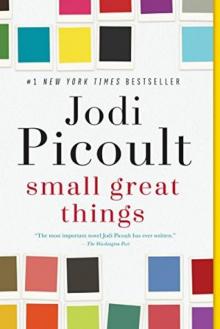 Small Great Things
Small Great Things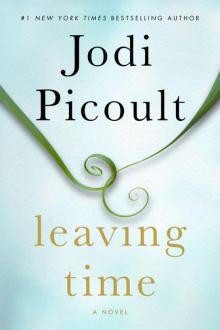 Leaving Time
Leaving Time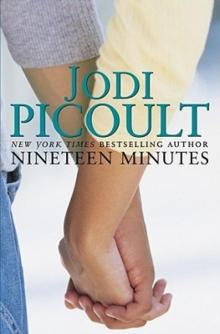 Nineteen Minutes
Nineteen Minutes Larger Than Life
Larger Than Life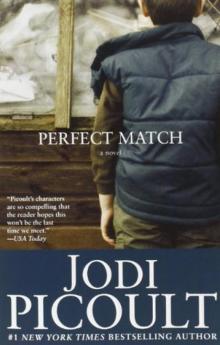 Perfect Match
Perfect Match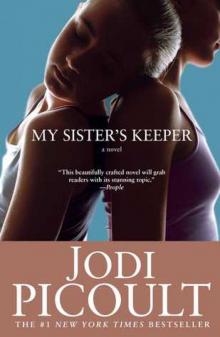 My Sister's Keeper
My Sister's Keeper The Pact
The Pact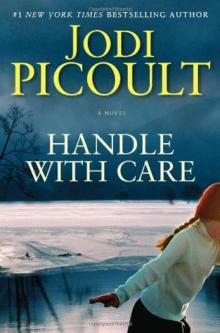 Handle With Care
Handle With Care Songs of the Humpback Whale
Songs of the Humpback Whale Mermaid
Mermaid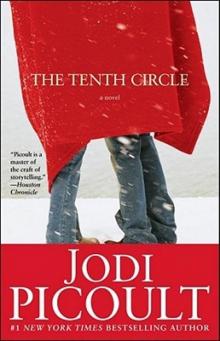 The Tenth Circle
The Tenth Circle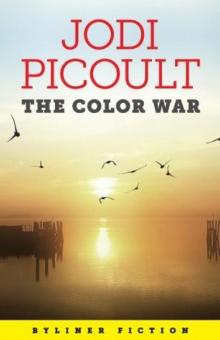 The Color War
The Color War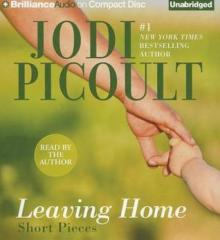 Leaving Home: Short Pieces
Leaving Home: Short Pieces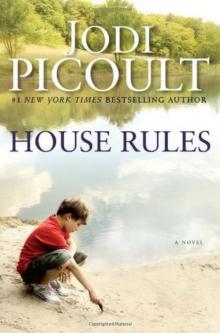 House Rules
House Rules Lone Wolf
Lone Wolf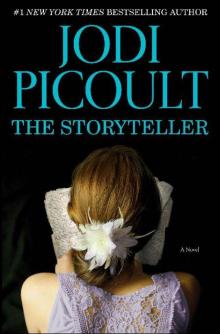 The Storyteller
The Storyteller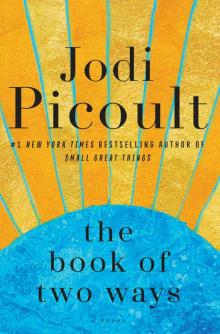 The Book of Two Ways
The Book of Two Ways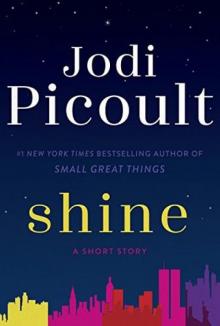 Shine
Shine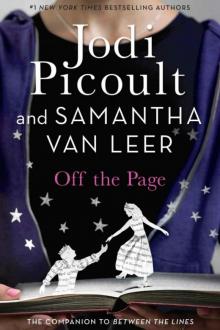 Off the Page
Off the Page Sing You Home
Sing You Home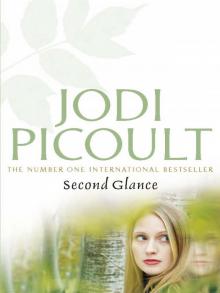 Second Glance: A Novel
Second Glance: A Novel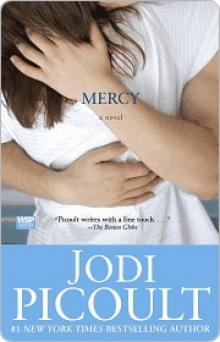 Mercy
Mercy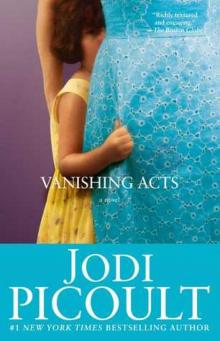 Vanishing Acts
Vanishing Acts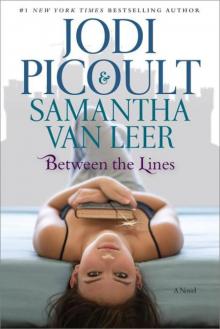 Between the Lines
Between the Lines Plain Truth
Plain Truth Salem Falls
Salem Falls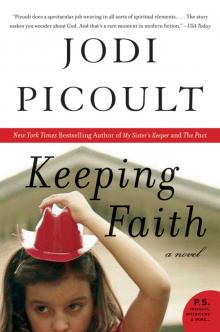 Keeping Faith
Keeping Faith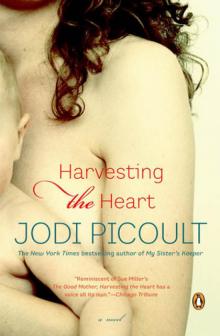 Harvesting the Heart
Harvesting the Heart Change of Heart
Change of Heart Where There's Smoke
Where There's Smoke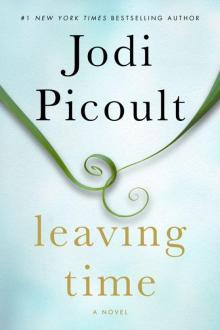 Leaving Time: A Novel
Leaving Time: A Novel Over the Moon
Over the Moon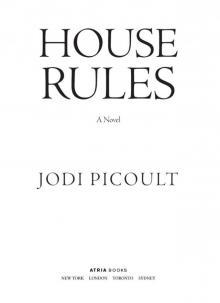 House Rules: A Novel
House Rules: A Novel The Jodi Picoult Collection #2
The Jodi Picoult Collection #2 Leaving Home: Short Pieces (Kindle Single)
Leaving Home: Short Pieces (Kindle Single)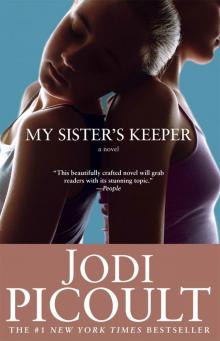 My Sister's Keeper: A Novel
My Sister's Keeper: A Novel![Mermaid [Kindle in Motion] (Kindle Single) Read online](http://i1.bookreadfree.com/i1/04/03/mermaid_kindle_in_motion_kindle_single_preview.jpg) Mermaid [Kindle in Motion] (Kindle Single)
Mermaid [Kindle in Motion] (Kindle Single) The Jodi Picoult Collection #4
The Jodi Picoult Collection #4 Sing You Home: A Novel
Sing You Home: A Novel The Jodi Picoult Collection
The Jodi Picoult Collection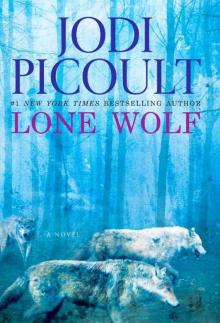 Lone Wolf A Novel
Lone Wolf A Novel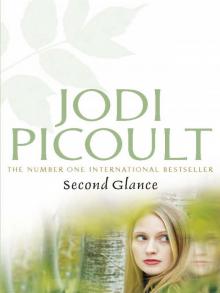 Second Glance
Second Glance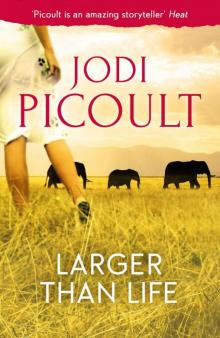 Larger Than Life (Novella)
Larger Than Life (Novella) The Jodi Picoult Collection #3
The Jodi Picoult Collection #3